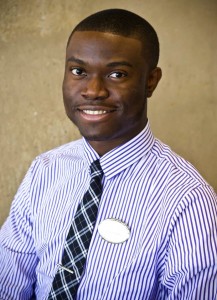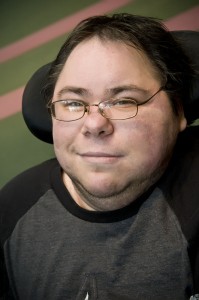
The Spring Commencement class includes applicants for 1,381 bachelor’s degrees, 612 master’s degrees and 26 doctorate degrees.
Wright State University President David R. Hopkins told a couple thousand new graduates that the value of a college degree has never been greater and urged them to change the world with their skills and passion.
About 2,000 students celebrated completing their degrees May 3 during Spring Commencement at the Wright State Nutter Center.
Hopkins said projections show there will be 55 million U.S. job openings by 2020, with 65 percent of them requiring education beyond high school. And he said fewer than 36 percent of working adults in Ohio have such an education.
“For the first time in this new century, the future truly belongs to those individuals with a college education,” Hopkins said. “You are well positioned with what you have learned at Wright State to succeed in the 21st century. I urge you to take what you’ve learned here and put it to good use.”
Hopkins also urged the graduating students to share their good fortune with others.
He quoted President John Adams, who said: “There are two types of education. One should teach you how to make a living and the other how to live.”
During commencement, an honorary Doctor of Humane Letters degree was presented to Deborah A. Feldman, president and CEO of Dayton Children’s Hospital.
Previously, Feldman was employed by Montgomery County for 30 years, serving the last 15 as Montgomery County administrator. She has a strong record of community service, active in addressing issues related to youth development, homelessness and health care.
Feldman told the students that inspiration and strength must come from within and to believe in themselves. She urged them to set high goals, work hard to achieve them and to get involved in the community.
Commencement photo gallery
View photos from the Commencement ceremony.
Of the 2,067 students who applied for degrees, 1,381 received their bachelors, 612 their masters and 26 their Ph.Ds.
The Spring Commencement class includes graduates ranging in age from 18 to 68 and hailing from 64 Ohio counties and 25 different states. There are 144 international students from 25 nations, with India boasting the single largest number of foreign graduates with 55.
And this graduating class has some smarts. A total of 42 undergrads are walking away with 4.0 GPAs.
For the most part, commencement is for the graduating students. Here are a few of the notable ones:
Taking Off
Brian Bolibrzuch, 26, cadet battalion commander for the Army ROTC, will receive his master’s in business administration and is headed for an Army career as a helicopter pilot. His father was an Air Force officer, and Bolibrzuch grew up around military aircraft.
“It’s my dream; it’s what I’ve wanted to do since I was a little kid,” he said.
What Bolibrzuch has done since he was a kid is serve as a mascot. He was the Golden Eagle mascot at Bellbrook High School, Brutus Buckeye at Ohio State (cheering at the football team’s appearance at the 2011 Sugar Bowl in New Orleans) and Rowdy Raider at Wright State.
Being a mascot, says Bolibrzuch, is a blast.
“You can do whatever you want,” he said. “You can be goofy. You can have some fun.”
Bolibrzuch bucked the trend by getting into Army aviation via ROTC. His maturity, fitness and leadership skills—as evidenced by his excelling at a 28-day leadership development assessment course held at Joint Base Lewis-McChord outside of Seattle—paved the way.
In September, he will be off to officer training and helicopter school at Alabama’s Fort Rucker, home of Army aviation.
Finding an Oasis
Dubem Obianagha, 23, is graduating with his master’s in public health. He grew up in the west African nation of Nigeria. Growing up in a middle-class family, Dubem experienced some trying times.
“Looking back at my childhood and who I have become now is one of the greatest gifts I have in life—experiencing the two sides of life” he said.
In 2007, during Dubem’s sophomore year at the University of Nigeria, Nsukka, his father was diagnosed with lung cancer and hospitalized. With his mother staying at his father’s bedside, Dubem would make a daily two-hour-plus round trip from college to take care of his two younger siblings. After his father died, Dubem vowed to become a doctor to honor his spirit.
In addition to his studies and carrying a 3.90 GPA at Wright State, Dubem puts in 55 hours a week at two jobs, working as a pharmacy technician at Kroger and as a graduate assistant at Wright State’s University Center for International Education. The center advises and supports international students and helps them achieve academic and personal success.
“Just to be able to meet people from different parts of the world and interact with them and be able to help them out with their needs has been an amazing experience for me,” he said.
After graduation, Dubem will begin pursuing a second master’s degree, in business administration, at Wright State and then hopes to get accepted at the Boonshoft School of Medicine.
“I’m seeing a lot of what I can become in life that I never saw when I was back in Africa,” Dubem said. “To me it’s like being in a desert with no water, and all of a sudden you find an oasis and you just keep drinking. The Lord has been my fortress.”
Making movies
Dominick Evans, 33, will be the first graduate of Wright State’s motion pictures production program with a significant physical disability.
Evans has spinal muscular atrophy, a genetic disorder that results in general muscle wasting and mobility impairment. At 16, he was no longer able to walk. Then when he was 22, he fell in the shower and broke his leg, forcing him to leave Wright State’s theatre program.
Evans moved to Michigan and was largely bedridden for five years. He and his girlfriend supported themselves with a writing and editing business.
“I got to a point where I was in bed and I just said, ‘I’ve got to get on with my life,’” he recalled. “’I don’t want to be that person that’s not doing anything. I have things I want to accomplish.’”
Evans, who uses a wheelchair full time to be independent, returned to Wright State in 2010 and enrolled in the motion pictures program to pursue his dream of being a film director.
“I made sure I surrounded myself with people who were willing to help be my arms and legs so that I could focus on the creative part of filmmaking,” he said. “But it was hard. It is physically exhausting to be in this program. I thought about quitting. But the professors were really supportive.”
Evans’ senior project film, Inamorata, is about a same-sex couple facing social pressures to change and conform during the mid-1960s. More than 100 people signed up for auditions to fill seven spots.
After graduation, Evans would like to move to New York City and make movies. He wants to tell stories not usually seen on film, such as movies about underrepresented populations.
“I would really like to do something on disability that’s not about disability,” he said. “Why can’t you do a story about someone who just happens to have a disability? That’s more like our lives. Our disability doesn’t necessarily define us.”




 Gov. DeWine reappoints Board Treasurer Beth Ferris and names student Ella Vaught to Wright State Board of Trustees
Gov. DeWine reappoints Board Treasurer Beth Ferris and names student Ella Vaught to Wright State Board of Trustees  Joe Gruenberg’s 40-Year support for Wright State celebrated with Honorary Alumnus Award
Joe Gruenberg’s 40-Year support for Wright State celebrated with Honorary Alumnus Award  Wright State’s elementary education program earns A+ rating for math teacher training
Wright State’s elementary education program earns A+ rating for math teacher training  Wright State’s Calamityville hosts its largest joint medical training operation
Wright State’s Calamityville hosts its largest joint medical training operation  Wright State University launches Strategic Plan 2030 to advance student success, enhance role as regional economic driver
Wright State University launches Strategic Plan 2030 to advance student success, enhance role as regional economic driver 